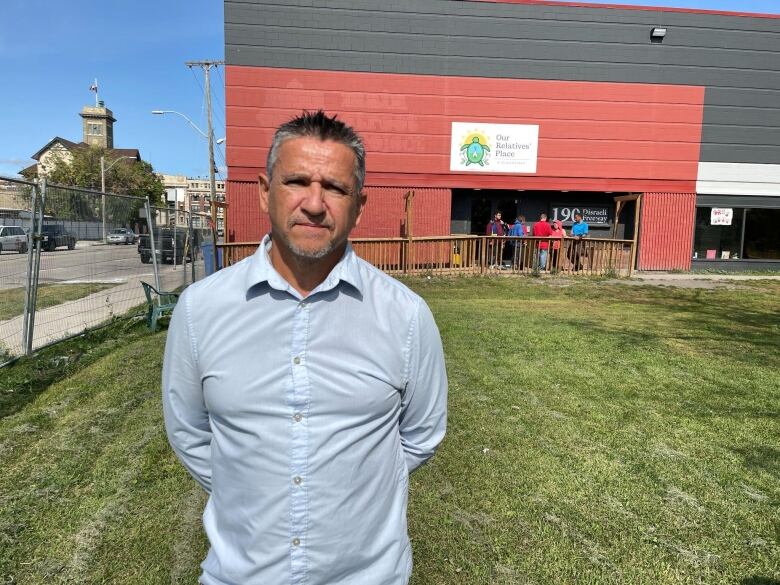'This is not my downtown Winnipeg': frustration grows with drug use, people living in bus shelters
Longtime residents speak out while a homeless advocate points to a housing solution

Shattered glass, garbage and a needle litter a dilapidated downtown bus shelter on Portage Avenue.
Nearby, beside the now shuttered Hudson's Bay store, someone is lying on a bench inside a bus shelter while Winnipeg Transit riders wait outside.
"This is not my downtown Winnipeg," said Kathleen Gibbons, 73, who is fed up with seeing this sight every day.
"I see a great change for the worst. I think the homelessness has increased, they are far more visible. Damaged buildings — you know, I've seen lots of buildings that have cardboard or wood on the windows because they've been smashed."

Gibbons has lived downtown for 14 years and grew up coming to the area as a kid to shop at Eaton's department store, which was demolished in 2003.
The retired social worker, who worked with the homeless, said she doesn't feel safe waiting inside a bus shack for Winnipeg Transit.
'Managing a crisis'
"I'm not going to go in there when they're passing the bottle around or the joint or whatever — the meth pipe," she said.
People have been loitering or living in bus shelters in Winnipeg for years and the problem, exacerbated during the COVID-19 pandemic, doesn't seem to be going away.
"We're managing a crisis right now," said Jason Whitford, CEO of End Homelessness Winnipeg.
"We need resources — daytime resources — where our relatives on the streets can go, whether they want to go back to school, whether they want to get a counselling session, whether they want to access health care."
Longtime resident moves
With the closure of many public spaces during the pandemic, Whitford said, homelessness became more visible and is still present due to the number of businesses that have closed.
He pointed to housing as a possible solution.
"We have a housing shortage in our city. Low-income housing is needed. Low-income, dignified, safe housing is needed throughout our city."
One longtime downtown resident said he decided to leave the area in June after living there for 22 years.
Miungun Olson, who grew up homeless as a teenager and moved into a downtown apartment in 1999, said while the area lost its lustre in his opinion about 10 years ago, it wasn't until the pandemic that he feared for his safety.
Seeing meth users running around the area screaming became unsettling, "and that's when even I started to feel unsafe," Olson said.
"They sort of had the run of the streets down there. There wasn't anyone else walking around or doing anything, and a lot of vehicles were getting broken into, and it just seemed like there were no cops around."
Olson said it's important to distinguish between homeless people and drug users in distress when talking about people's perception of downtown.
"They think that homeless people are really dangerous," he said. "And you know, when I was a homeless person, we were always the victims of what was happening. It was never the other way around."

The Downtown Winnipeg BIZ, which speaks for the downtown business community, says there isn't a silver bullet that will solve the problems in the area.
CEO Kate Fenske said the creation of the Downtown Community Safety Partnership is making a difference by patrolling the downtown 24/7.
While the pilot program connects some of the city's most vulnerable with appropriate resources, Fenske said it's not enough.
"We know we need to grow that program," she said. "We need to secure some sustainable funding so we can take it beyond December of this year."
She said cities across the country are dealing with similar safety concerns in their downtown areas.
"It's really about having more people downtown," she said. "That's what it comes down to."

Even with the return of thousands of University of Winnipeg students to downtown, Brigette Tadao says she doesn't feel safe.
When asked about her first impression of Winnipeg, the international student from the Philippines said: "When I saw the … homeless people around I don't really feel safe, especially when you see the people in the bus shelters."
Tadao, who has been in Winnipeg for about nine months, wants to see police on the street patrolling and believes the bus shacks should be removed because commuters "are afraid to go inside."
Gibbons hopes the 15 candidates running for mayor will offer ideas on how to improve the downtown.
Her message to the mayoral hopefuls: "Please take the homeless people into consideration. You know, they're people, too."
She is blunt with how she feels about the current situation.
"I think Winnipeg as a whole is going downhill," Gibbons said. "I'm not proud to live here, but I'm 73 years old and I'm here."
With files from Cory Funk


